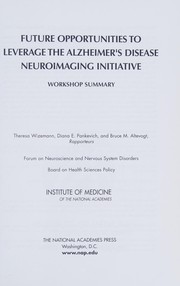
|
Sex differences and implications for translational neuroscience researach
|
Theresa M. Wizemann,Bruce M. Altevogt,Diana E. Pankevich |
"Biological differences between the sexes influence not only individual health but also public health, biomedical research, and health care. The Institute of Medicine held a workshop March 8-9, 2010,… |
OL15958489W |

|
Future opportunities to leverage the Alzheimer's Disease Neuroimaging Initiative
|
Theresa M. Wizemann,Bruce M. Altevogt,Diana E. Pankevich |
"Nearly 5.3 million Americans are living with Alzheimer's disease, and 26.6 million people are affected worldwide. The Alzheimer's Disease Neuroimaging Initiative (ADNI), a public-private partnership… |
OL16143206W |

|
Generating evidence for genomic diagnostic test development
|
Theresa M. Wizemann,Adam C. Berger |
"Ten years after the sequencing of the human genome, scientists have developed genetic tests that can predict a person's response to certain drugs, estimate the risk of developing Alzheimer's disease… |
OL16191745W |

|
Preparedness and response to a rural mass casualty incident
|
Theresa M. Wizemann,Bruce M. Altevogt,Kristin Viswanathan |
Problems contacting emergency services and delayed assistance are not unusual when incidents occur in rural areas, and the consequences can be devastating, particularly with mass casualty incidents. … |
OL16217545W |

|
Health literacy implications for health care reform
|
Theresa M. Wizemann |
Health literacy is the degree to which one can understand and make decisions based on health information. Nearly 90 million adults in the United States have limited health literacy. While poor health… |
OL16285631W |




